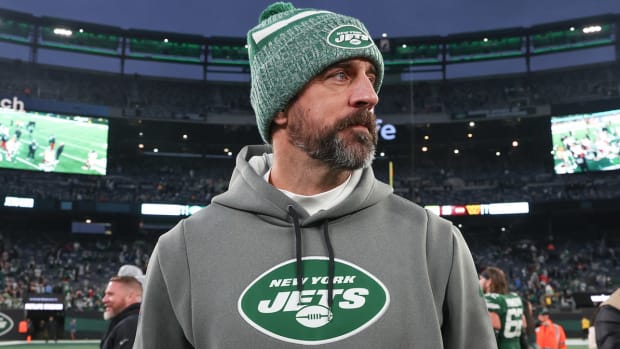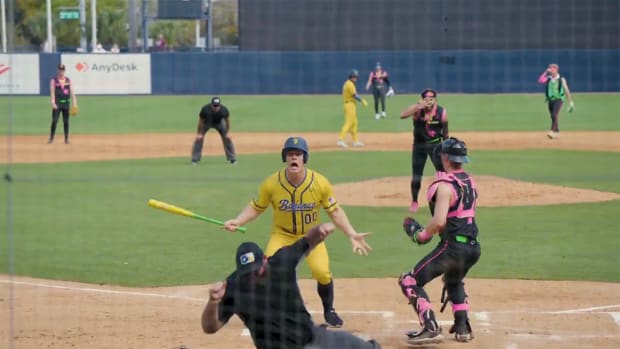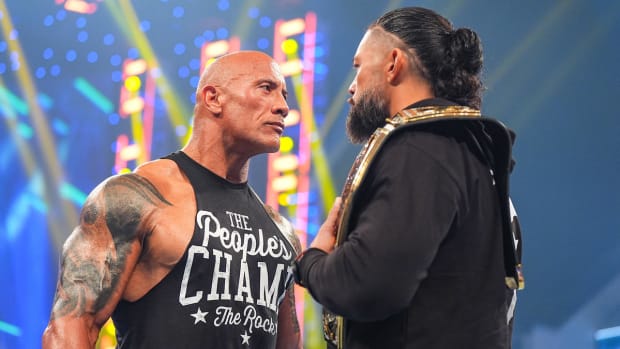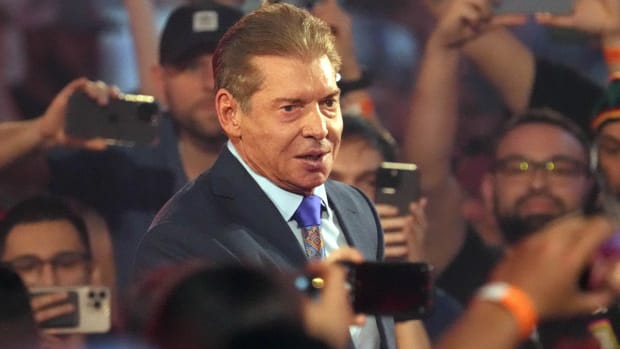The Raw After WrestleMania Shows How Important Fans Are to WWE
BROOKLYN — Elias sits on a stool in the middle of the wrestling ring wearing what looks like a tapestry from the 1300s as a cloak. His long hair is greasy, his beard is full, his guitar is acoustic. The night before, during WrestleMania at MetLife Stadium, John Cena made a surprise appearance and interrupted this Medieval-looking wrestler’s rock opera. Cena is now best known for starring in movies and granting hundreds of Make-A-Wish Foundation wishes, but WWE birthed him. So he revisited his “Doctor of Thugonomics” phase and strode down the long runway wearing jorts, a Yankees jersey flapping open over his perfectly toned pecs and several gold chains. He didn’t wrestle, but he did mercilessly roast Elias.
Tonight, at the Monday Night Raw after WrestleMania Sunday, Elias is telling the crowd that he simply will not stand for this kind of behavior. Whoever dares to interrupt this musical performance will die.
And that’s when the bell tolls. We all know for whom.
The crowd of thousands—there is no empty seat in Barclays Center—rises to its collective feet, its collective hands stretching toward the vaulted ceiling like some giant sea anemone opening up in the depths of the ocean. The arena goes dark. Lightning bolts cut across the video boards. The most famous funeral dirge in the world surges out of the speakers, and here comes the Deadman.
That’s right: Undertaker, the iconic wrestler who seemingly retired two years ago (there are no rules here) has made one of his periodic returns from retirement to pile drive Elias one more time. The audience screams. Fans remember watching this legend on TV with their parents, or perhaps they’ve come to love him on their own, or with their children, and they thought they’d already said goodbye. This is like going to your grandfather’s funeral one year and then watching him stroll through the front door on Thanksgiving the next.
If you’re not familiar with the “WWE Universe,” as the WWE calls it, the Monday Night Raw after WrestleMania is when storylines that were furthered at the biggest event of the year are teased out. It’s the brunch after the wedding; everyone’s a little banged up but they’re all less tense, and the people who show up are the ones who really care. While the WWE always announces who will be performing at WrestleMania—save a few surprises like Cena—no one knows what’s going to happen the night after.
I certainly have no idea; I recapped WrestleMania two years ago without ever having seen a moment of pro wrestling before in my life. Once a year I revisit this strange and wonderful and brutal world. This is the first show I’ve seen live.
It turns out that it’s the first show many lifelong fans have ever seen in person, too. In the concourse before the first match, Ashley and Jess Barber are buying sodas and popcorn. The sisters flew here from Wales to go to WrestleMania, and it didn’t disappoint. They loved seeing Seth Rollins win the Universal Championship from Brock Lesnar, a villain who looks like a refrigerator grew arms and legs and learned how to perform a suplex. Judging by the crowd’s reaction when Rollins comes out tonight to challenge Kofi Kingston—another fan favorite and who finally won the WWE Championship after wanting it for eleven years—the Barber sisters are not alone.
But they don’t love Becky Lynch as much as most fans do.
“Becky’s alright,” Jess says. “But if Becky didn’t win last night, people would’ve gone mental. It would’ve been a very angry crowd.”
It would’ve. Becky has stolen the fans’ hearts with her Irish brogue and an intense, powerful gaze that’s as strong as her small frame. Last night she beat Charlotte Flair and Ronda Rousey to take home the Raw Women's Championship and SmackDown Women's Championship. When she makes her entrance tonight, to a heavy metal version of a folk tune that sounds like aluminum is being run through a paper shredder, I feel like someone hooked me up to a 5000-volt battery and turned it on while pouring water on my head. The crowd loses it completely, singing along to Becky’s wordless theme song.
This woman owns the entire arena. She leans over the ropes and hoists up the two belts she won when the women headlined WrestleMania for the first time in 35 years. The decibels rise to somewhere around “thirty airplanes taking off at once.”
“You’re f---ing hot!” yells a fan behind me. “You’re hot! Becky two belts!”
She stands there basking in the noise, and then tells the crowd that nine years ago, she was a bartender working a few miles away. She speaks about leaving home at 15 and how she’ll never give up. WWE loves a good persistence trope. Suddenly, Becky is interrupted by Lacey Evans. They begin to fight.
“Who said wrestling’s fake!” the same fan yells.
Last year, I took a few lessons from WWE legend Jonny Rodz at Gleason’s Gym in Brooklyn. While much of these matches are mapped out and the outcome predetermined, that doesn’t mean this isn’t an incredibly physical, painful sport. There’s a beautiful, terrible rhythm to it: bodies crashing down onto the mat is the beat, and the roar of the crowd is the melody. The wrestlers I trained with told me the whole key to this dance is controlling time. As a superstar, you’re a maestro at manipulating moments, at being slow to get up, quick to pounce, knowing how long to stare into the crowd. A second in the real world can become seven in the ring. Physics don’t apply to the WWE.
Becky beats Lacey up easily before striding off into the wings. WWE this year gave people what they wanted at WrestleMania. Michael Passariello, a 19-year-old from Boston, was one of the satisfied customers. He’s here with his brother Alessandro, 16, who wears a Universal Championship belt that Seth Rollins signed for him at an event last week. Michael feels like he’s drifting away from WWE as he gets older. Becky has helped pull him back in.
“I think she’s cool,” he says. “She brings a different element to what I’m used to seeing. It’s cool to see someone walking around with a t-shirt saying ‘The Man’ and rocking two belts now. It’s hard to find wrestling cool still at 19. I’m growing out of it. But Becky keeps it real. Seeing it live, I felt like a kid again last night.”
Ron Fried, Mike Langan, and Tim Gill also love Becky and the women’s main event. The three friends have ditched their jobs and families and taken most of the week off to tailgate at WrestleMania and come to Monday Night Raw and the SmackDown show on Tuesday. They’re sunburned (with tan lines from their wraparound sunglasses) after drinking beer and Johnny Walker and whatever was still cold for hours in the parking lot of MetLife yesterday. Fried lives in New Jersey now, but he’s from Brooklyn and has always loved WWE.
“It’s a soap opera,” he says. “For grown men. And now women. And with all the spin-off reality shows? It’s a monopoly. Vince McMahon, man.”
It is a monopoly. The McMahon family has a chokehold on pro wrestling. A recent segment on John Oliver’s show Last Week Tonight went into detail about how WWE keeps wrestlers on contracts with exclusive rights to their performances, as opposed to employing them full-time and giving them benefits. Many former wrestlers praised the piece. WWE disputed it.
What’s indisputable is that WWE owns its fans as much as its superstars and needs both to survive. The product is made for television. When you watch it on TV, it feels larger-than-life. In person, the wrestlers are more identifiable as people, even if they’re three times the size of normal ones. The brutality is much more obvious in the flesh; watching someone bash their head on a post without the distance of a screen is gruesome.
But the TV product doesn’t work without the live product, because the crowd is as much a character as the wrestlers. And it knows its role. Before the show starts this evening, there are a few warm-up matches. Barclays isn’t that loud. But the minute a voice comes over the loudspeaker to tell us we’re fifteen seconds away from being broadcast live, the place is ready. The cheering begins, the signs are lifted, and it becomes clear that we are as necessary to this show as a blank surface is to words.
After Taker, it’s time for the last match. Taker’s match is the first time it’s really felt like the Monday Night Raw after WrestleMania. The crowd is usually absolutely insane the whole time, but tonight has been more subdued than in years past, according to the two Canadian guys next to me in the nosebleeds. And now something feels off about a match between Seth and Kofi. Yesterday they both won. And now they’re supposed to face each other? WWE is known for playing fast and loose with faces and heels, but to turn one of the Extra Good Guys into a villain seems rash, even for them.
It turns out it is. Sheamus and Cesaro show up, so Kofi and Seth team up to take them down. The crowd doesn’t like this finale—they think it’s a bait-and-switch. I hear fans grumbling about it as they leave the arena. Which is funny, because before the show, I asked people what they wanted from tonight and none of them could say exactly. They just crave surprises the day after WrestleMania, big ones, and they expect WWE to give them what they don’t even know they desire.
Many of the fans I asked also couldn’t explain why they like the characters they like. But how could they? How do you explain falling in love? How do you explain the feeling you get when your favorite NFL team takes the field? It’s just a connection, a response to basic human narratives and the Greek Myth-like storylines the McMahons pump into our brains. This enjoyable manipulation compels people to travel across oceans and borders and state lines to watch their Heroes of Spandex and Glitter. This business trades in energy, in primal pulls, in stories of sons and daughters. It’s a product of nostalgia and the reason that I feel weak when Undertaker—a man I remember from my first WrestleMania—returns.
I finally understand for myself that this is about memory and being a part of something. To an outsider, it seems silly to watch grown men and women prance around in lace-up boots and sparkly bikini bottoms. Or watch them play guitars. Or dramatically run their fingers through their greasy hair. But when you’re on the inside, when you care about these people and what happens to them, the pageantry makes sense. I envy the wrestlers and die-hard fans who can summon energy from the depths of the earth and completely lose themselves to a world of make-believe that most of us leave behind as children. Because for a brief moment tonight I got lost, too. And it felt like being a kid again. It felt like belonging.




